Monday, July 29th 2019

AMD Radeon 19.7.3 Drivers Increase RX 5700 Series Idle Fan Speeds by Over 50%
AMD's recent Radeon Software Adrenalin 19.7.3 beta drivers appear to break the fan settings of reference-design Radeon RX 5700 XT and RX 5700 cards. All earlier drivers for these cards offered good idle fan-speeds, despite the lack of fan-stop, with the fan of Radeon RX 5700 XT idling around 14% or 740 RPM. Once the new 19.7.3 drivers are installed, the fan-speed never drops below 23% or 1,170 RPM. This phenomenon can be observed even on the reference RX 5700, which now idles at 22% fan-speed, or 1,130 RPM, up from 13% or 685 RPM. This increases fan speed RPMs by 66% for the RX 5700 XT and +57% for the RX 5700. To demonstrate this bug, we first installed reference RX 5700 XT and RX 5700 cards with 19.7.2 drivers, and logged their idle fan-speeds using GPU-Z. Next we switched to 19.7.3 and recorded the same data for a completely idle card, sitting at the desktop.
The raised idle fan-speeds keep the GPU cooler when idling. With 19.7.2, the GPU hotspot was observed to be around 42 °C. Booting from 19.7.3, we see hotspot temperature settle down to around 38 °C for the RX 5700 XT, and to 37 °C for the RX 5700. Such a small difference at such low temperatures really shouldn't have any effect on longevity or anything else. On the other hand, higher fan-speeds also mean that the idle fan-noise levels are noticeably higher, and no longer match the idle fan-speeds measured in launch-day reviews by TechPowerUp and other tech publications.Update (30/07): We can confirm that the 19.7.4 drivers released late Monday do not fix this issue.
In our reviews we praised AMD for excellent idle fan speeds that make their cards whisper quiet in idle, despite the lack of the idle-fan-stop feature. With 19.7.2, the the card's idle noise output was measured at 27 dBA. With 19.7.3 and its idle fan speed raised, our RX 5700 XT now has an idle fan-noise output of 29.4 dBA. The RX 5700 went from 27.8 dBA to 29.7 dBA.
Maximum fan speeds are unaffected, because both cards are configured with a certain maximum RPM fan speed limit, which is reached after around half a minute of gaming. It seems that during gaming, that limit takes priority over the change in fan speed observed with 19.7.3 Beta.
It's also extremely surprising that AMD's driver patch notes don't mention such a significant change at all. There must be a log of someone making changes in the relevant driver code? While we can understand that not everything that's new gets reported publicly, especially if it affects rare edge cases, or apps used only by few users, adjusting the fan speed kind of changes the product that AMD sold to their customers, and they should be made aware of such changes promptly.
We reached out to AMD for comment and hope this is just a bug that gets addressed in the next driver update.Update: The 19.7.4 drivers don't fix this issue, nor is it part of the "known issues" in the driver's changelog.
The raised idle fan-speeds keep the GPU cooler when idling. With 19.7.2, the GPU hotspot was observed to be around 42 °C. Booting from 19.7.3, we see hotspot temperature settle down to around 38 °C for the RX 5700 XT, and to 37 °C for the RX 5700. Such a small difference at such low temperatures really shouldn't have any effect on longevity or anything else. On the other hand, higher fan-speeds also mean that the idle fan-noise levels are noticeably higher, and no longer match the idle fan-speeds measured in launch-day reviews by TechPowerUp and other tech publications.Update (30/07): We can confirm that the 19.7.4 drivers released late Monday do not fix this issue.
In our reviews we praised AMD for excellent idle fan speeds that make their cards whisper quiet in idle, despite the lack of the idle-fan-stop feature. With 19.7.2, the the card's idle noise output was measured at 27 dBA. With 19.7.3 and its idle fan speed raised, our RX 5700 XT now has an idle fan-noise output of 29.4 dBA. The RX 5700 went from 27.8 dBA to 29.7 dBA.
Maximum fan speeds are unaffected, because both cards are configured with a certain maximum RPM fan speed limit, which is reached after around half a minute of gaming. It seems that during gaming, that limit takes priority over the change in fan speed observed with 19.7.3 Beta.
It's also extremely surprising that AMD's driver patch notes don't mention such a significant change at all. There must be a log of someone making changes in the relevant driver code? While we can understand that not everything that's new gets reported publicly, especially if it affects rare edge cases, or apps used only by few users, adjusting the fan speed kind of changes the product that AMD sold to their customers, and they should be made aware of such changes promptly.
We reached out to AMD for comment and hope this is just a bug that gets addressed in the next driver update.Update: The 19.7.4 drivers don't fix this issue, nor is it part of the "known issues" in the driver's changelog.
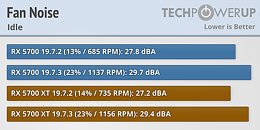
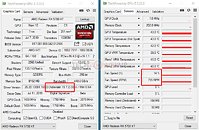
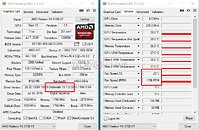
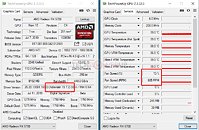
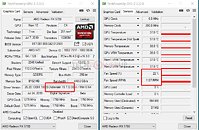
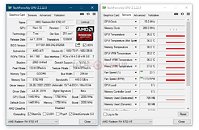
37 Comments on AMD Radeon 19.7.3 Drivers Increase RX 5700 Series Idle Fan Speeds by Over 50%
A fan spins a bit faster so the card runs a bit cooler, dear lord the inhumanity, wont someone think of the children!
The difference in actual audible sound goes from slightly above completely silent to just ever so slightly more above completely silent. To me, anyone complaining about such a difference needs to pull the silver spoon out of their mouth and chill out.
I wonder why AMD made such a knee-jerk change. If ~740rpm was too low, why such a big change? 1170rpm is clearly audible, even if it's not obtrusive - and I get the feeling that ~1050rpm or lower would be silent or inaudible at any normal distance.